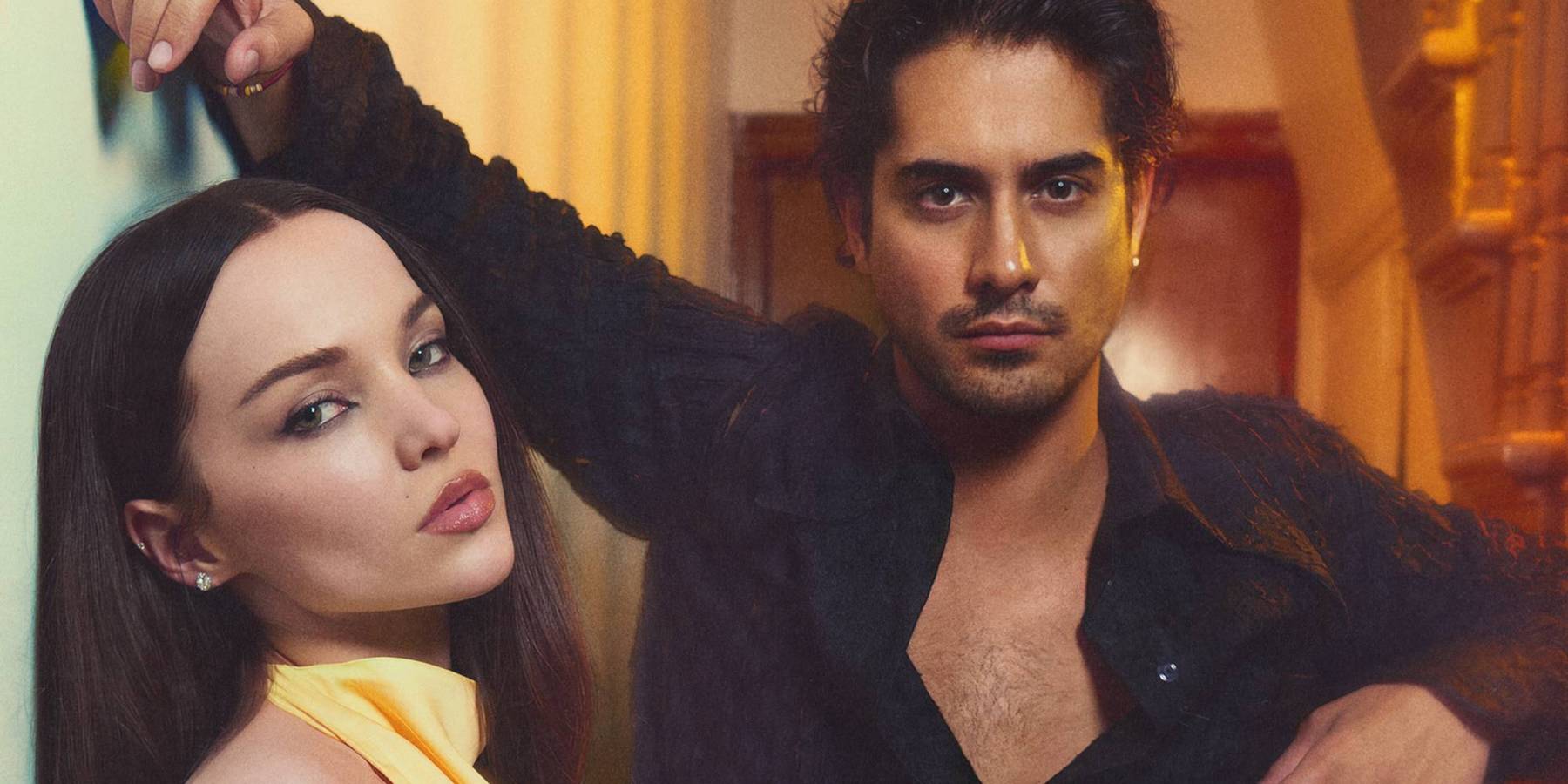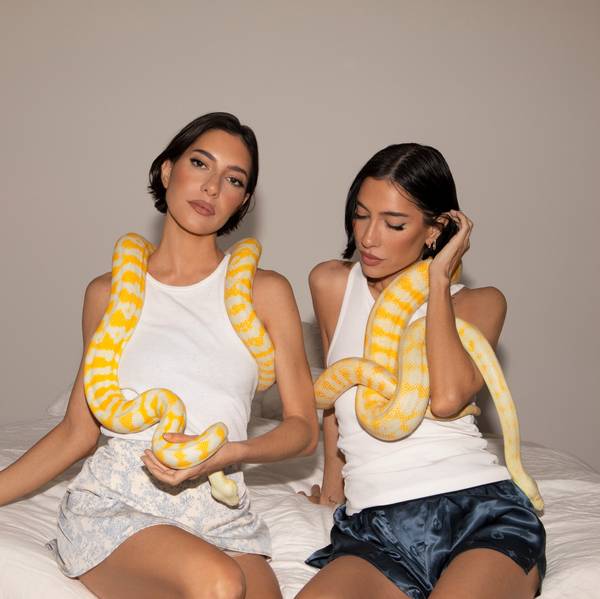
The Veronicas Are Back, Never Left
By Joan Summers
Apr 05, 2024“When I was in high school, my friend and I tried to give ourselves stick and poke tattoos of ‘4ever’, but we totally failed.” I’m embarrassed at my sudden desire to admit this in my conversation with Jessie and Lisa Origliasso, AKA The Veronicas. But the story spills out of me before I have the chance to think very hard about it or close my mouth.
The Australian pop rock legends are back for their fifth studio album, Gothic Summer, and we’re catching up over Zoom. Together, they crashed into the scene with The Secret Life of the Veronicas in 2005. “4ever,” the album’s lead single, was the herald of what would soon become an industry-defining sound from the Origliasso twins: slick guitars, charged vocals and lyrics with an undeniably queer edge. Of late, that genre they inarguably helped shape has gained traction with new and old fans alike, with power players like Travis Barker of Blink 182 contributing to this album and others. Emo Nite, at which I was recently in attendance, is in cities across America, nostalgic line-ups are taking over festivals and the freshman class of contemporary musicians and veteran producers alike are casting their gaze backwards.
The sisters are the first to admit that they were, at times unknowingly, the only women on the bill, or surrounded by peers who were overwhelmingly men (and straight, no less.) Just last year, they were on the lineup of the When We Were Young festival in that very position. But they stress to me that it’s always been about the music, and with that focus, over the last 20 years, they’ve tempered their edge in the flames of an industry that hasn’t necessarily made it easy for them. “I think there’s a lot of outside things that will happen during really long careers, that will have you question what you should be doing, where you should be going,” Jessie tells me. “Sometimes you get that right, sometimes you get that wrong.”
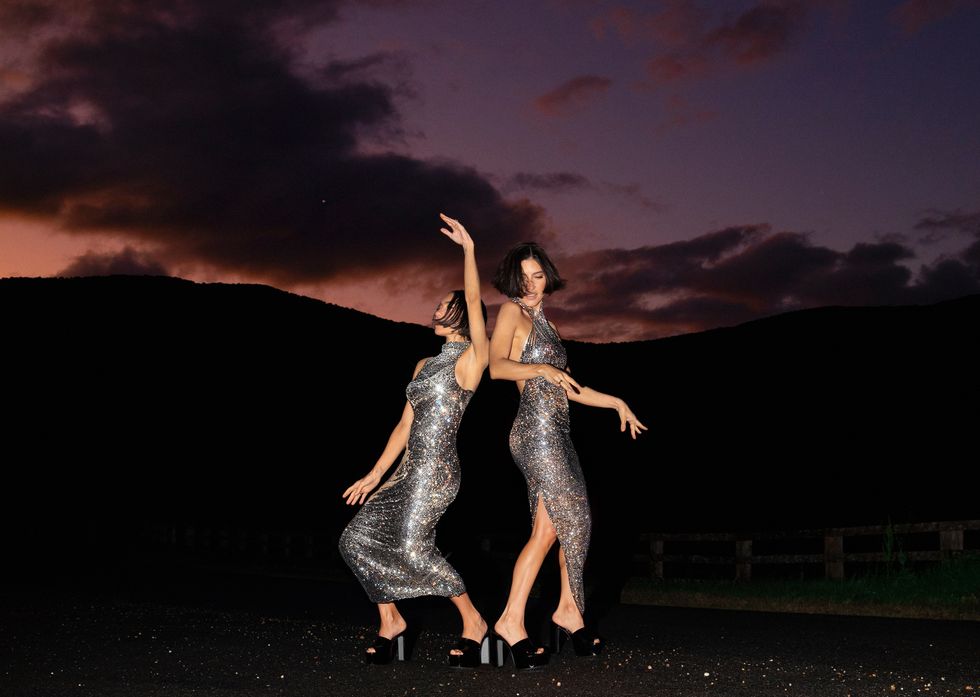
The sentiment bleeds through on Gothic Summer. See the opening track “Perfect”: “I was never like them/ Sick of hitting my head on that glass ceiling/ Falling in line can be fatal/ I'd rather be a fucking mess than stable.” On the sparkling “Here to Dance,” the sisters call each other to the dancefloor under the spiteful gaze of both the tabloids and onlookers, while “Jungle” acts like a feminist re-imagining of the Brothers Grimm, backed by hauntingly breezy surf rock arrangements. The Sisters Grimm, as it were.
I hastily wrap up my story about the stick and pokes, and they both laugh, clearly amused. I wish I could call up my friend and tell them, Do you know who I’m chatting up this afternoon? I hide the redness in my cheeks with a coffee cup and move on. My attempt at casualness belied the gulf between myself and the wide-eyed teen with a needle and a dream on the floor of my best friend’s bedroom, our battered Hook Me Up CD spinning around for another replay.
For now, I’ve got The Veronicas in front of me, and the questions seem endless. Read our full conversation below. (This interview has been edited for clarity.)
Congratulations on your new album! How does it feel to be back making music?
Jess: It feels so exciting. I just feel like we’re going through a very big celebration and time in our lives. I think, coming up to our 20th anniversary next year, the new album coming out this week and then the USA tour kicking off next week as well. It’s our first time in ten years reconnecting with those fans. So we’re just sort of pinching ourselves.
What does it feel like to be twenty years into this and still have people eagerly waiting for new music, eagerly waiting to see you both tour stateside?
Jess: We feel blessed, essentially, that we are still so in love with music that we’re doing this twenty years later and that people are connecting with the new music and all our albums A lot of people are discovering some of the music for the first time, or they’re having a new love affair with the music. I suppose it’s like a dream. When you think about a trajectory of a career as an artist, I think that you couldn’t want anything more than exactly that happening.
It’s interesting, because we’re living through a resurgence in the kind of music you guys have been creating since the 2000s and are still creating today. What is it like to watch that explosion of new interest in rock, and specifically women fronted rock?
Jess: It’s incredibly inspiring and fulfilling for us. We always say we’re in the industry of songwriting and telling stories. I see so much female-fronted rock music right now; it’s the music that we love. I’m a huge riot grrrl fan, and there was that in the '90s. Seeing that sort of female confidence and the effects of that? Just women with guitars telling their own stories, having that be at the forefront? It’s beautiful, the evolution of society, pop culture, all of it.
I’m curious, because as a fan of that music back in the day as well, it would often feel a bit lonely, going to festivals, going to shows and feeling, at times, surrounded by predominantly men onstage and off. On the music side, did you ever feel similar, being one of the few prominent women-led bands?
Jess: I have to be honest and say, we were so inspired by music in general, we really didn’t see it at the time. I don’t think we realized, or necessarily even processed the fact that we maybe were one of a few female artists at the time that were doing this genre. If anything, it became more apparent now, because when we’re doing some festivals and we’re one of the only female acts on. Then we’re like "Oh!" But we always felt like we just wanted to be the best.
Lisa: Obviously the riot grrrl era had a huge impact on us, The Divinyls, Chrissy Amphlett.
Jess: There were also a lot of Australian badass women! Even like, Gwen Stefani, Britney Spears, Avril Lavigne.
Lisa: We were big, big pop lovers as well.
Jessie: I think when we came out, we wanted to have that spirit as well.
Lisa: There’s that spirit, right? That toughness. There’s that sort of passion that they all embody, that was just so hypnotic. We were also so lucky to grow up in a family that really supported us being strong women. I think it translates to the music and how essentially, even if we didn’t realize it at the time, as Jessie said, we were quite fearless. We weren’t overly thinking it through.
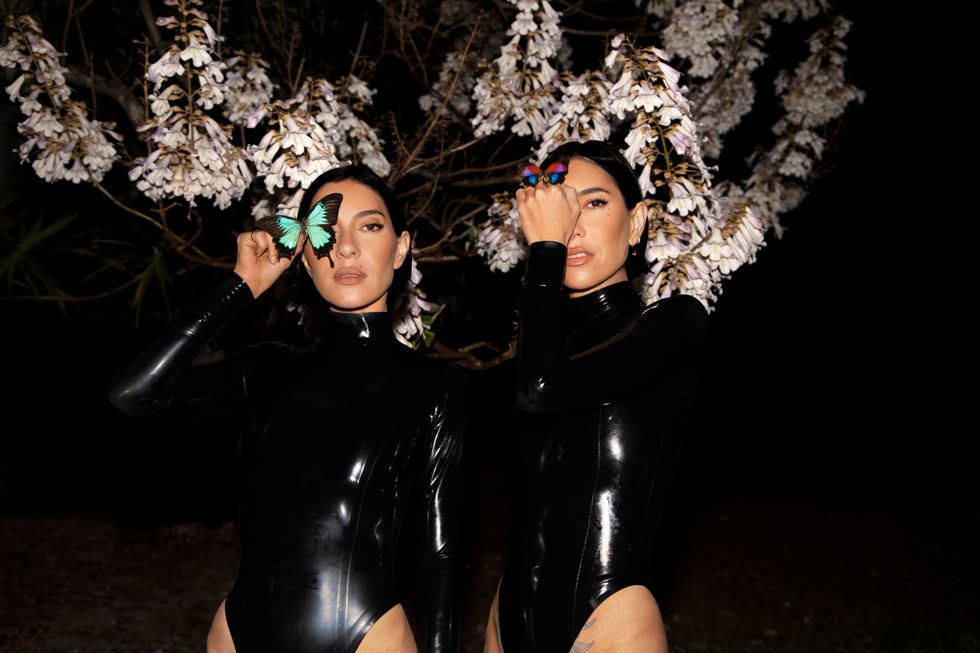
You both bring up people like Britney, and I can really hear those pop influences on this new album Gothic Summer. I’d love to know what other inspirations you pulled from going into it?
Lisa: Gothic Summer was a bit of a surprise album for us. We didn’t actually intend to go in making a record. We went and caught up with a friend here in Los Angeles, actually, who was a producer, John Feldmann. He’s a bit of a mentor and a friend of ours. We just went over to his house to have coffee and meditate. As you do, as artists, we’re playing some cool music that we’re digging and he grabs a guitar and we just start writing. That day, we wrote two of the tracks from Gothic Summer, a song called “Perfect” and a song called “Invisible.”
He calls up Travis Barker, who’s down the road, and he comes in, chucks down some drums, and by the end of the day, we’re all like? What just happened? This has been a really fun day? And John was like, "You’ve got to make another album," and so we said, "Let’s do it."
Jessie: We’re so influenced by a lot of different music, and for us, we grew up singing Elvis, Connie Francis, like a lot of old school music. What we listen to in our downtime now—
Lisa: Eclectic! It’s very eclectic!
Jessie: Because the aesthetic has always been a huge driving force for us, it always has been from the beginning, we sort of create and imagine these worlds, aesthetically, that go hand in hand with what our stories are.
Lisa: We grew up as big musical theater buffs. That element of dramatization and theatrics holistically works in our world. For us, on Gothic Summer, we were thinking about not just how it sounds, but how it feels and what it looks like, and the journey, the immersive experience of that. During the last few years, we’ve been predominantly in a live performance space, especially at festivals back home in Australia. We kind of realized the diversity of festivals we were being put on to play, from literally a hardcore rock festival, and then the next week, we were playing EDM lineups, hip hop and folk lineups. For us, we were like, "Wow, these songs really translate through so many different boundaries and fanbases." Going into the studio, we had no worries about where we would take this thing. We just did whatever we felt like doing on that day. It is a cross-genre melting pop of different influences.
Jessie: The full spectrum of pop and rock!
It’s serendipitous that I’m talking to you right now because I just talked to the founders of Emo Nite, a party here stateside. They played one of your songs at a recent party, and watching the crowd transition from really hardcore music to “Untouched,” it transitioned perfectly. The crowd was screaming every lyric. I’m interested: With the live performances, was it nice to have a chance to get away from the creation of new music and just immerse yourselves in those crowds?
Lisa: It was an absolutely incredible experience. Because when you're onstage in front of people again at festivals, it’s not just our own show. There are kids there to see these other artists, not just us. You’re in front of 1000s to 10,000s of people. When a song of ours hits, and they’re just singing every word back to you from a song we wrote seventeen years ago, it’s just… wow! The power of music! What that means to people, you’re reminded of that, because that’s essentially what music has always been to us too. It’s the greatest compliment that as songwriters, we’ve written a song that connects with people on that level.
Jessie: We’re seeing this more and more, with the internet, there’s so many different genres. I think it used to be that genres reflected a particular community and culture. Now, people have such diverse tastes in different things. I think it's why people are loving the music so much, especially the back catalog. It’s not just: if you’re a fan of pop-punk, you’re a fan of The Veronicas. We see this with Taylor Swift. It doesn’t matter what genre you’re into, people love Taylor Swift, they love her songwriting and her stories. People are having a new connection with songs and the artists behind those songs. I think it’s a really interesting time in music because of that. People don’t feel locked into one particular genre. We’re able to come together.
Lisa: We don’t have to define ourselves by just one genre of music now. It’s so diverse, we have such access to different music and artists.
Jessie: There are so many more platforms now to access music, to discover it. Obviously, community is important, and people are able to understand each other more by being like, Oh! You’re a fan of that too. I wouldn’t think I’m a fan of that. We can try to understand or become closer in that regard. It’s a beautiful time for sharing and rediscovery.
As someone who was listening to this music back in the day as well, it’s been interesting to watch your album Hook Me Up gain traction on platforms like TikTok. Or a song like "Untouched "goes through a cycle of being a gay anthem for different generations of people. Does it surprise you when this music gains new life or new meanings to newer fans?
Jessie: Oh yeah, very surprised. Untouched is one of the most surprising songs to us because it has spanned such a huge, diverse range of people. Growing up, we’re a part of the LGBTQ+ community, and that's been the most important part, I think, of The Veronicas. We’re having this experience on the other side, where a lot of sports teams, male rugby league, the AFL, all love this song. All these diverse ages of people and different cultures of people connected with this song.
Lisa: For us, social media really brought that to our attention. I think it was probably, what, how many years ago, that "Untouched" started to have a big moment virally. It was just this influx of so much coming at us at once with this song, and then all these people rediscovering it, some for the first time. Seventeen years later it gained a whole new fanbase.
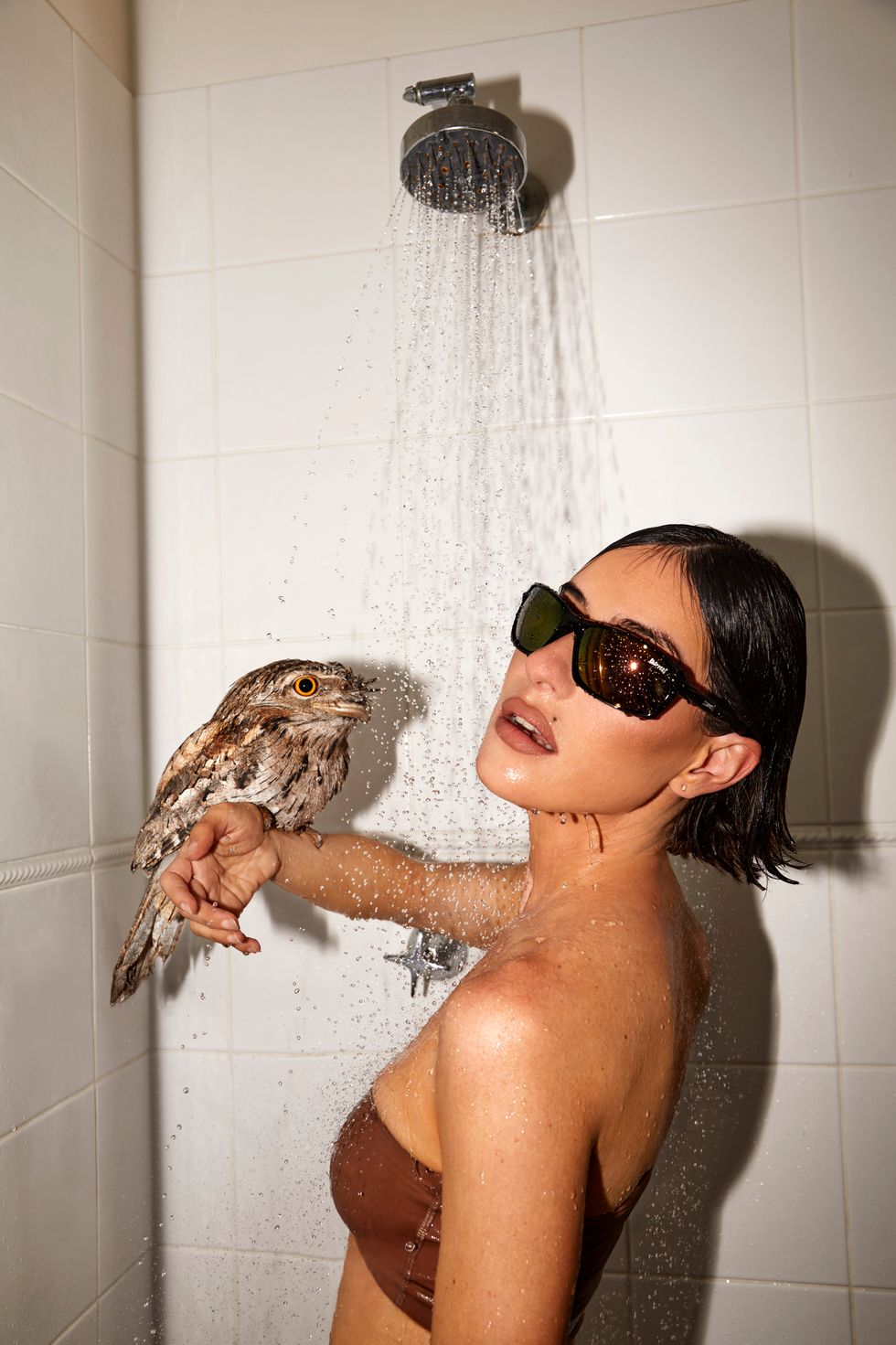
Back in the day, we’d burn your CDs to share with our friends and now they send each other TikTok videos. It’s interesting how that happens in the queer community now too, which you bring up. In your experiences of the industry and how people in the industry have treated you, what does it feel like to now be at a place where you can wholeheartedly embody that side of yourselves as artists?
Jessie: That’s a beautiful question! To be completely honest, for us, there was no disconnect at all. Every single Veronicas show from the beginning was a safe space for queer people. Because of that space we’ve lived in, regardless of prying eyes from the outside or the rest of the media, it didn’t really throw us off. We never really felt like there was any hiding. I think if anything, society has caught up to how all of our greater community has been living for a long time. Obviously, politically, and socially, there are still things happening that need to change, and evolve.
Not that there isn’t fear and shame put upon us, but it’s just beautiful to see that people are able to stand in their power. As time goes on we’re evolving, especially with the younger generation that are able to speak more freely, and be themselves, which is the most important thing for anybody on this planet, that they are safe to be themselves, regardless of the context. The queer community is the backbone of The Veronicas. We grew up in theater, all of our best friends and a lot of our family were queer. We grew up on queer cinema and theater. For us as artists, we were going to KD Lang at nine years old. Our best friend, Courtney Act, has been our best friend since we were two years old.
Shoutout Courtney!
Jessie: Courtney, we love you. She’s just so inspiring.
Lisa: For us, we feel like the luckiest girls in the world for how we grew up.
Jessie: To have that support from the beginning for queer people is the most important thing, because a lot of people didn’t have support outside of their chosen families from a young age. So, they know how to rally and they know how to support and they know what real love and loyalty is.
Lisa: Remember mum was like, mum to so many kids growing up, when they didn’t have that family support. I think she is the one that instilled our value system, who taught us how to love and support everyone around us. So we carry that with us.
Jessie: Listening, I think, is the most important thing. Always come from a place of love and not fear. That has shaped The Veronicas and our music, our community and we are so blessed to be here still today.
A lot of my friends and I gravitated to this genre, this music, because we felt like the misfits, and it felt like the other misfits were out there making the music.
Jessie: That’s so beautiful, thank you for saying that. I think, like you were saying, it was predominantly men’s stories about straight relationships. We came out at a time when we were writing about our own curiosity and experiences. I love thinking back to all the amazing souls in those crowds that felt like they had somewhere to go, to relate to. I think if there’s anything we’re the proudest of in The Veronicas, it’s that our fanbase was there to catch us and grow with us. I think that’s important to note. We wanted this to be a safe space for them and they created this safe space for us. We couldn’t have done it without them, it’s a beautiful, symbiotic relationship.
Both of your private lives have become quite public over the last few years, and you took some time away before your last album and worked on your relationship, as we saw on your MTV series The Veronicas: Blood For Life. I wonder what lessons you learned about working with each other as sisters that carried onto this album?
Lisa: Wow, I love that question.
Jessie: I think the most important lesson that we’ve learned is that it’s really important to work with people who have the same value system as you.
Lisa: We were just talking about that this morning.
Jessie: I think a value system is really important to align yourselves with. Lisa and I have the utmost respect for each other, we will always have each other's backs. We believe in ourselves and each other. I think there are a lot of outside things that will happen during really long careers that will have you question what you should be doing and where you should be going and having an aligned value system of what is important to you is the most important thing. Sometimes you get that right sometimes you get that wrong and you learn and move on. We’re so proud of what we’ve created. The Veronicas, for us, is a huge celebration. We hope that our fans are proud of us, too.
Photography courtesy of The Veronicas
From Your Site Articles
Related Articles Around the Web
MORE ON PAPER
Entertainment
Dove Cameron and Avan Jogia Broke Their Molds
Photography by Gustavo Chams / Story by Joan Summers
Photography by Gustavo Chams / Story by Joan Summers
18 February
ATF Story
Madison Beer, Her Way
Photography by Davis Bates / Story by Alaska Riley
Photography by Davis Bates / Story by Alaska Riley
16 January
Entertainment
Cynthia Erivo in Full Bloom
Photography by David LaChapelle / Story by Joan Summers / Styling by Jason Bolden / Makeup by Joanna Simkim / Nails by Shea Osei
Photography by David LaChapelle / Story by Joan Summers / Styling by Jason Bolden / Makeup by Joanna Simkim / Nails by Shea Osei
01 December
Entertainment
Rami Malek Is Certifiably Unserious
Story by Joan Summers / Photography by Adam Powell
Story by Joan Summers / Photography by Adam Powell
14 November
Music
Janelle Monáe, HalloQueen
Story by Ivan Guzman / Photography by Pol Kurucz/ Styling by Alexandra Mandelkorn/ Hair by Nikki Nelms/ Makeup by Sasha Glasser/ Nails by Juan Alvear/ Set design by Krystall Schott
Story by Ivan Guzman / Photography by Pol Kurucz/ Styling by Alexandra Mandelkorn/ Hair by Nikki Nelms/ Makeup by Sasha Glasser/ Nails by Juan Alvear/ Set design by Krystall Schott
27 October
